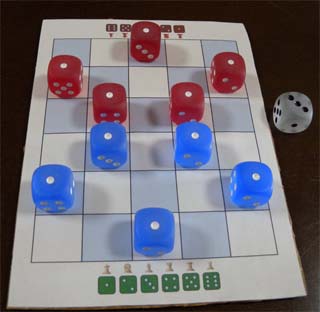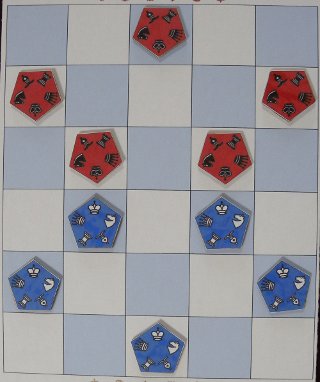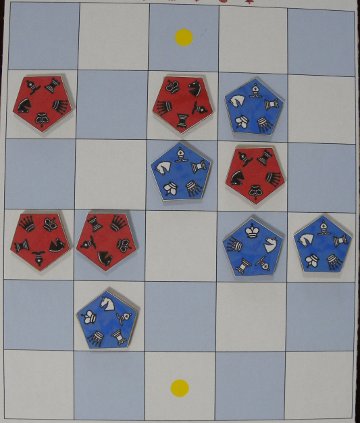
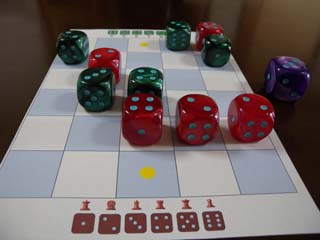

Rinne is now playable online: Enjoy the game !!!
- RinneTensei: The Japanese version of this page
Introduction
The RinneTensei was invented by Masahiro Nakajima, the Curator of 'The Museum of Abstract Strategy Games', in 2009.
RinneTensei is a collective name for two different games: Rinne and Tensei.
Rinne is an abstract game for two players, based on FlipFlop that was designed also by Masahiro Nakajima in 2009, with more strategic characteristics. You will experience rugby or American football-like dynamic gamesmanship on a 5x6 small game board. The game's playing time is rather short (only 10-20 minutes), but you will be amazed with the game's strategic depth realized with the unique design of the movements of the pieces.
Tensei is a variant of Rinne with a random factor.(Thus, Tensei is not an abstract strategy game.)
Setup
|
Rinne and Tensei are played between two opponents on a 5x6 square board.
|
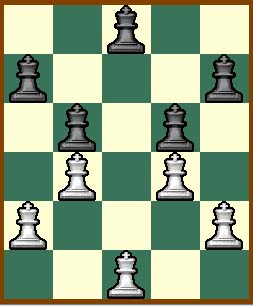 5x6 Board used for a standard Rinne and Tensei (Checker patterns are reversed in this figure as this has been picked up from the Zillions' default 5x6 boards) |
Pieces
Each player has 5 pieces, which move as King, Knight, Bishop, Rook, and Queen. With the Penta-pieces, you will see the current status of the piece on the corner that faces the moving direction.Rules
Goal
You win when any of your pieces is placed in the middle square in the last row, your goal square (i.e., the 6th row center file for white, and the first row center file for black when played on 5 x 6 boards) for two consecutive turns, or when there is no legitimate moves left for your opponent.
The game ends in a draw if the identical position appears on the board for three times.
Movements
All pieces start as King, one piece in the goal position on your end, then the four others on a M-shaped line on the 2 and 3 ranks.
Pieces move exactly the same as in normal chess games, except that they cannot be captured as in normal chess. Pieces can be captured, only when they are either in your or oppnent's goal square.
The player with the white pieces commences the game.
After each move, pieces are promoted:
In Rinne, in a fixed order: King -> Knight -> Bishop -> Rook -> Queen -> King...
In Tensei, promotion of pieces are determined by rolling a dice.
Playing Tips
Always watch how many pieces are aiming at your/opponent's goal from each side. Even if, you have more armies that are aiming at a goal than opponent's, make sure your opponents' pieces are not interfering your paths.Equipment
When you play the game on a real board, you can use two different-color sets of dices as pieces: The spot '1'=K, '2'=N, '3'=B, '4'=R, '5'=Q. The spot '6' is invalid.
When using dice pieces for Tensei, in each turn, you move the piece to the designated square, place it '6' up to show that the next promotion being decided, then roll the dice, which is separately prepared for rolling, to determine the next transmigration. Your piece transmigrate on the cast of the dice. When getting '6,' roll the dice again, as '6' is not used here.
When getting 6 in Tensei, roll it again as 6 is invalid here. In each turn, you move the piece to the square, turn 6 up, then roll the dice to determine the next transmigration. And then you turn the piece face as the dice rolled
Sample Games
- VariantName=Rinne (5x6) Standard
- 1. King e2 - e3 = Knight
- 1. King e5 - d5 = Knight
- 2. King a2 - b2 = Knight
- 2. Knight d5 - b6 = Bishop
- 3. Knight e3 - d5 = Bishop
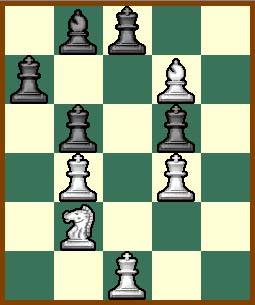
- 3. Bishop b6 - c5 = Rook
- 4. King c1 - c2 = Knight
- 4. King c6 - d6 = Knight
- 5. Knight b2 - a4 = Bishop
- 5. Knight d6 - b5 = Bishop
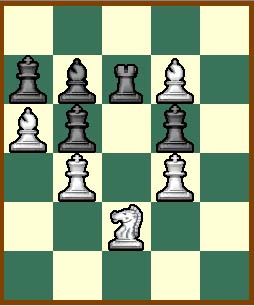
- 6. King d3 - e2 = Knight
- 6. Bishop b5 - a6 = Rook
- 7. Bishop d5 - e6 = Rook
- 7. Rook a6 - d6 = Queen
- 8. Knight c2 - e1 = Bishop
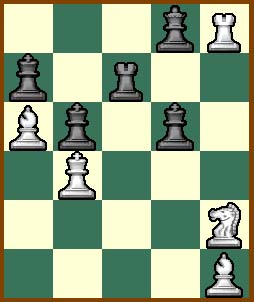
- 8. King b4 - c4 = Knight
- 9. King b3 - b4 = Knight
- 9. King d4 - e5 = Knight
- 10. Bishop e1 - c3 = Rook
- 10. Rook c5 - d5 = Queen
- 11. Knight e2 - d4 = Bishop
- 11. King a5 - b5 = Knight
- 12. Bishop d4 - b6 = Rook
- 12. Knight c4 - e3 = Bishop
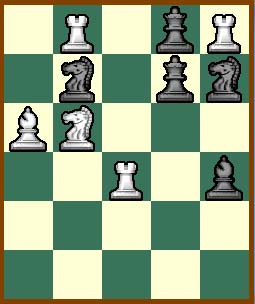
- 13. Knight b4 - c6 = Bishop
- 13. Knight e5 x c6 = Bishop
- 14. Rook b6 x c6 = Queen
- 14. Queen d5 x c6 = King
- 15. Rook c3 x c6 = Queen
- 15. Queen d6 x c6 = King
- 16. Rook e6 x c6 = Queen
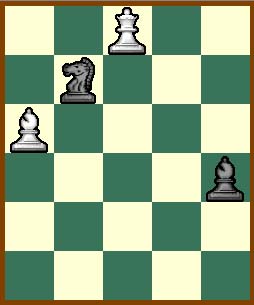
Download †
The game is also available at Zillions of Games.
Zillions Game File †
Executable program source files for Zillions of Games are available here. All the variants introduced in this page are playable.
Paper Board & Pieces †
Printable version of the 5x6 board and the pieces of the Rinne&Tensei are available here.
You can also use 5 sets of two different colors of dices as the game's pieces. Please adjust the board size appropriately when the dice pieces are used.
NOTE †
Rinne and Tensei are Japanese words: Rinne is pronounced with an accent on the last 'e' (as 'é', like an egg). Rinne means reincarnation and Tensei means transmigration.
The photos at the page top show our new Penta-pieces
(July/2009 version). The Penta-pieces have solved all the
following problems that the Dice-pieces had ![[bigsmile]](/images/face/bigsmile.png) :
:
- it was difficult to find the right spots of the dice for the next promotion
- there was no indication how the piece moved
- there was no indication which direction the piece went
The sign on the corner that faces the moving direction shows the current status of the piece. In order to promote your pieces after in the end of each move, you only have to turn the piece to the left, then, the sigh you see on the corner that faces the moving direction shows the promoted status of the piece.
Please find detailed information on all the variants of RinneTensei at Zillions of Games.
- FlipFlop (English): A twinned-game of Rinne
Copyright © Masahiro Nakajima 2009, www.nakajim.net 2009, All rights reserved.
